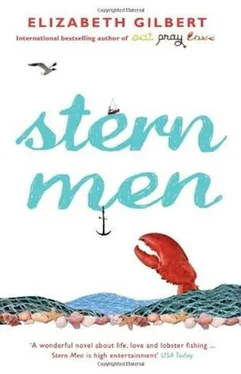“We’ll never set trap limits,” Ruth said.
“They may be set for you, young lady. If your fishermen will not do it voluntarily, it may become a law, and there will be wardens crawling all over your boats, just as there were when the size limits were set. That’s how innovation comes to Fort Niles. It has to be rammed down your stubborn throats until you choke on it.”
Did he just say that? She stared at him. He was smiling slightly, and he had spoken in an even, mild tone. Ruth was appalled by his snide little speech, uttered with such ease. Everything he said was true, of course, but that haughty manner! She herself may have said some nasty things about Fort Niles in her time, but she had the right to speak critically of her own island and her own people. Hearing such condescension from someone so smug and unattractive was intolerable. She felt indignantly defensive, suddenly, of Fort Niles. How dare he!
“The world changes, Ruth,” he went on. “There was a time when many of the men on Fort Niles were hakers. Now there’s not enough hake left in the Atlantic to feed a kitty cat. We’re losing redfish, too, and pretty soon the only lobster bait left will be herring. And some of the herring the men are using these days is so bad, even the seagulls won’t eat it. There used to be a granite industry out here that made everyone rich, and now that’s gone, too. How do the men on your island expect to make a living in ten, twenty years? Do they think every day for the rest of time will be the same? That they can count on big lobster catches forever? They’re going to fish and fish until there’s only one lobster left, and then they’ll fight to the death over the last one. You know it, Ruth. You know how these people are. They’ll never agree to do what’s in their best interest. You think those fools will come to their senses and form a fishing cooperative, Ruth?”
“It’ll never happen,” Ruth said. Fools?
“Is that what your father says?”
“That’s what everyone says.”
“Well, everyone may be right. They’ve certainly fought it hard enough in the past. Your friend Angus Addams came to a cooperative meeting once on Courne Haven, back when our Denny Burden nearly bankrupted his family and got himself killed trying to form a collective between the two islands. I was there. I saw how Angus behaved. He came with a bag of popcorn. He sat in the front row while some more highly evolved individuals discussed ways that the two islands could work together for the benefit of everyone. Angus Addams sat there, grinning and eating popcorn. When I asked him what he was doing, he said, ‘I’m enjoying the show. This is funnier than the talking pictures.’ Men like Angus Addams think they’re better off working alone forever. Am I correct? Is that what every man thinks over on your island?”
“I don’t know what every man on my island thinks,” Ruth said.
“You’re a bright young woman. I’m sure you know exactly what they think.”
Ruth chewed on the inside of her lip. “I think I should go help Mrs. Pommeroy now,” she said.
“Why do you waste your time with people like that?” Pastor Wishnell asked.
“Mrs. Pommeroy is my friend.”
“I’m not talking about Mrs. Pommeroy. I’m talking about Fort Niles lobstermen. I’m talking about Angus Addams, Simon Addams-”
“Senator Simon is not a lobsterman. He’s never even been in a boat.”
“I’m talking about men like Len Thomas, Don Pommeroy, Stan Thomas-”
“Stan Thomas is my father, sir.”
“I know perfectly well that Stan Thomas is your father.”
Ruth stood up.
“Sit down,” said Pastor Toby Wishnell.
She sat down. Her face was hot. She immediately regretted sitting down. She should have walked out of the room.
“You don’t belong on Fort Niles, Ruth. I’ve been asking around about you, and I understand that you have other options. You should take advantage of them. Not everyone is so fortunate. Owney, for instance, does not have your choices. I know you have some interest in my nephew’s life.”
Ruth’s face got hotter.
“Well, let’s consider Owney. What will become of him? That’s my worry, not yours, but let’s think about it together. You’re in a much better position than Owney is. The fact is, there is no future for you on your island. Every pigheaded fool who lives there ensures that. Fort Niles is doomed. There is no leadership over there. There is no moral core. My heavens, look at that rotted, run-down church! How was that allowed to happen?”
Because we fucking hate you, Ruth thought.
“The whole island will be abandoned in two decades. Don’t look surprised, Ruth. That’s what may well happen. I sail up and down this coast year after year, and I see communities trying to survive. Who on Fort Niles even tries? Do you have any form of government, an elected official? Who is your leader? Angus Addams? That snake? Who’s coming down the pike in the next generation? Len Thomas? Your father? When has your father ever considered anyone else’s interests?”
Ruth was getting ambushed. “You don’t know anything about my father,” she said, trying to sound as measured as Pastor Wishnell, but sounding, in fact, somewhat shrill.
Pastor Wishnell smiled. “Ruth,” he said, “mark my words. I know a great deal about your father. And I’ll repeat my prediction. Twenty years from now, your island will be a ghost town. Your people will have brought it on themselves through stubbornness and isolation. Does twenty years seem far away? It isn’t.”
He leveled a cool gaze on Ruth. She tried to level one back.
“Don’t think that because there have always been people on Fort Niles, there always will be. These islands are fragile, Ruth. Did you ever hear of the Isles of Shoals, from the early nineteenth century? The population got smaller and more inbred, and the society fell to pieces. The citizens burned down the meeting house, copulated with their siblings, hanged their only pastor, practiced witchcraft. When the Reverend Jedidiah Morse visited in 1820, he found only a handful of people. He married everyone immediately, to prevent further sin. It was the best he could do. A generation later, the islands were deserted. That could happen to Fort Niles. You don’t think so?”
Ruth had no comment.
“One more thing,” Pastor Wishnell said, “that came to my attention the other day. A lobsterman on Frenchman’s Island told me that back when the state first introduced size limitations on lobsters, a certain lobsterman named Jim used to keep short lobsters and sell them to the summer people on his island. He had a nice little illegal business going, but word got around, because word always gets around, and someone notified the fishing warden. The fishing warden started following old Jim, trying to catch him with the shorts. He even inspected Jim’s boat a few times. But Jim kept his shorts in a sack, weighted with a rock, that hung down from the stern of his boat. So he never got caught.
“One day, though, the fishing warden was spying on Jim with bin-oculars and saw him filling the sack and dumping it over the stern. So the warden chased Jim in his police boat, and Jim, knowing he was about to be caught, throttled his boat as fast as it could go, and took off for home. He drove it right up on the beach, grabbed the sack, and made a run for it. The warden chased him, so Jim dropped the sack and climbed up a tree. When the warden opened the sack, guess what he found, Ruth?”
“A skunk.”
“A skunk. That’s right. You’ve heard this story before, I gather.”
“It happened to Angus Addams.”
“It didn’t happen to Angus Addams. It didn’t happen to anyone. It’s apocryphal.”
Читать дальше









